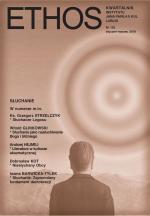 zobacz powiększenie | DOI 10.12887/32-2019-1-125-11 Margaret A. GORALSKI, Krystyna GÓRNIAK-KOCIKOWSKA − Education in the Times of Artificial Intelligence: The Will to Listen as a New Pedagogical Challenge Cena brutto: 7,00 PLN za szt. |
|
One of the most prominent problems in education is that a great number of students nowadays apparently lack the will to listen; in particular to listen critically. Critical listening is inextricably linked with critical thinking, which, in turn, is perceived as the ability necessary for successful functioning in post-Enlightenment societies. In the past years, the authors of this paper devoted a number of works to the problem of critical thinking and critical listening. This text focuses on the issue of listening (especially the will to listen) as a challenge to education in a qualitatively new situation of today, when educational systems globally are in the process of incorporating cognitive sciences and other emerging and converging disciplines as well as digital technologies, in particular Artificial Intelligence. The presence of these new factors poses a variety of challenges to educational theories and practices. Many of them have an impact on the problem of listening and the will to listen. Some of these challenges, especially the ones related to Artificial Intelligence and to the understanding of the human brain, are unprecedented and require investigations of serious ethical, social, political, economic and other issues all the way to the most fundamental philosophical questions. The authors discuss a selected number of such issues, mainly in the context of the problem of listening and the will to listen. Considering the possibility of further development of Artificial Intelligence and its potential to match or even replace a great number of activities hitherto regarded as uniquely human, the authors point out to the necessity of a deeper investigation of human condition, especially in terms of ethics and spirituality; and of the value of life shared on this planet not only by human and non-human organisms but potentially also by living entities created by humans in the form of Artificial Intelligence. In this context, the principle of the Reverence for Life (all life) as understood by Albert Schweitzer appears to be particularly valuable as a bridge into the future. That points out to the new significance of education as a vehicle, which humankind uses to move from the past to the future. It gives also a new, elevated, value to the will to listen, and to listening in general. Keywords: interdisciplinary research, education, ethics, critical thinking, cognitive science, listening, critical listening, educational systems, Artificial Intelligence, will to listen, Reverence for Life, life Contact: Margaret A. Goralski, Strategy and Entrepreneurship Department, Quinnipiac University, School of Business, 275 Mount Carmel Avenue, Hamden CT 06518-1908, USA; Krystyna Górniak-Kocikowska, Professor Emerita, Philosophy Department, Southern Connecticut State University, 501 Crescent Street, New Haven, CT 06515, USA Pliki do pobrania: » 125_Goralska_Gorniak.pdf | |
